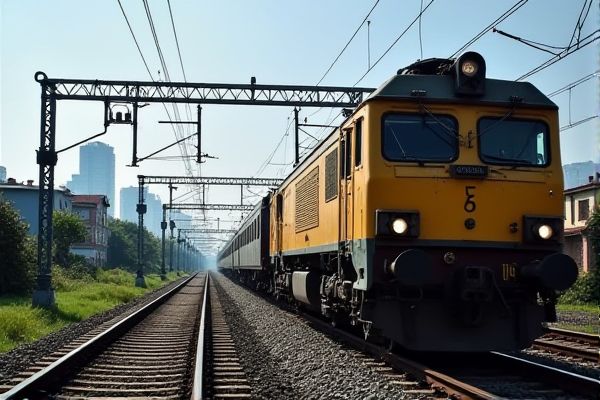
Railway signaling positions in Thailand play a crucial role in ensuring safe and efficient train operations across the network. The system is primarily controlled through the use of centralized traffic control (CTC), which enhances communication between stations and signaling equipment. Key positions include signalmen and dispatchers who monitor and manage train movements, ensuring adherence to schedules and safety protocols. Understanding the layout and operations of these signaling positions is essential for improving operational efficiency and reducing the risk of accidents on the railways.
Job Description
Railway signalling jobs in Thailand involve the design, installation, and maintenance of signalling systems to ensure safe and efficient train operations. Professionals in this field work with cutting-edge technology, including automatic train protection and interlocking systems, to enhance railway safety standards. Knowledge of local railway regulations, as well as expertise in electrical engineering and telecommunications, is essential for success in these roles. Opportunities are often available with both state-owned and private railway companies, providing a range of career paths in this growing sector.
Requirement
Railway signalling jobs in Thailand require a strong understanding of electrical engineering principles and experience with railway operations. Proficiency in signal control systems and safety protocols is essential for ensuring safe train movements. Relevant qualifications such as a degree in engineering or a related field, along with certifications in railway signalling, are often necessary. Familiarity with local regulations and the ability to collaborate with multidisciplinary teams can significantly enhance your job prospects in this growing sector.
Salary and Perks Expected
Railway signalling jobs in Thailand typically offer competitive salaries, which can range from 30,000 to 80,000 Thai Baht per month, depending on experience and specific roles. In addition to salary, many companies provide various perks such as health insurance, annual bonuses, and opportunities for professional development. The demand for skilled signalling professionals has been increasing due to infrastructure expansions and upgrades in the rail network. You can expect a dynamic work environment that fosters skill enhancement and career growth in this vital sector.
Similar Job Names
- Signal Engineer
- Signaling Technician
- Signaling Designer
- Signaling Project Manager
- Railway Signaling Systems Analyst
- Signaling Maintenance Supervisor
- Signaling Operations Manager
- Track Circuit Technician
- Signaling Installation Engineer
- Signaling Safety Inspector
- Systems Integration Engineer
- Train Control Systems Engineer
- Railway Signaling Consultant
- Signaling Quality Assurance Engineer
- Signal Tester
Job Expectation Concept
Railway signalling jobs in Thailand require a deep understanding of both electrical systems and safety protocols to ensure the smooth operation of train services. Professionals in this field are responsible for designing, installing, and maintaining signalling equipment, which includes signals, track circuits, and control systems. Knowledge of local regulations, technology trends, and effective communication skills are essential for collaboration with other railway staff and engineers. Continuous training and up-to-date certifications are critical for maintaining competency in this rapidly evolving sector.
Career Advantage and Weakness
Railway signalling jobs in Thailand offer career advantages such as job stability and a growing demand for skilled professionals due to ongoing infrastructure development. The expansion of the railway network, including high-speed trains, creates opportunities for advancement and specialization within the field. However, a potential weakness is the limited availability of training programs and resources, which can hinder your ability to gain the necessary qualifications. Additionally, the work often requires long hours and can involve challenging conditions, impacting work-life balance.
Important Thing Must Know
Railway signalling jobs in Thailand play a crucial role in ensuring the safety and efficiency of train operations. These positions involve managing and overseeing signaling systems that control train movements, vital in preventing accidents and optimizing schedules. Familiarity with local railway regulations and technology is essential for success in this field. Opportunities for training and certification are available through various institutions, equipping you with the necessary skills. The growing railway infrastructure in Thailand creates promising career prospects for those interested in this specialized area.
Alternative Career Options
Railway signaling jobs in Thailand can lead to a variety of alternative career options. You might explore opportunities in transportation planning, where you can contribute to the development of efficient transit systems. Another option is to transition into railway maintenance, focusing on ensuring the safety and reliability of signaling technology. Emerging fields such as smart transportation systems could also benefit from your expertise, integrating advanced signaling solutions with modern technology for improved efficiency and safety in Thailand's railway networks.
Companies List
- State Railway of Thailand
- Bangkok Mass Transit System (BTS)
- Mass Rapid Transit Authority of Thailand (MRTA)
- Eastern & Oriental Express
- Thai Railways International
- Bangkok-Kanchanaburi Exposure Company
- Rail Engineering Solutions Thailand
- Thai Transport and Logistics
- Charoen Pokphand Group
- Bangkok Expressway and Metro Public Company Limited
List of Ideal City
Bangkok is a central hub for railway signalling jobs in Thailand, offering numerous opportunities within the transportation sector. Chiang Mai, known for its growing infrastructure, presents a dynamic environment for those looking to advance their careers in this field. Khon Kaen is another city where regional rail projects are on the rise, creating demand for skilled professionals in railway signalling. Phuket, although more famous for tourism, is increasingly investing in transport development, making it a potential location for rail-related job prospects.
 jobs-thailand.com
jobs-thailand.com